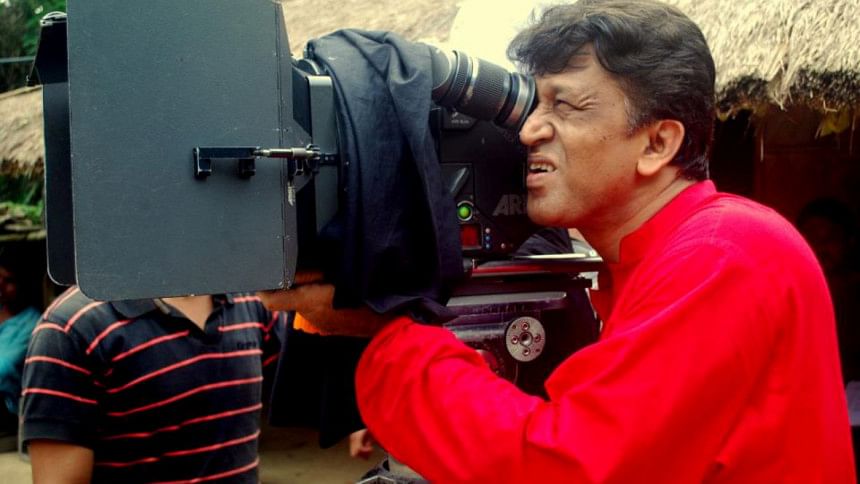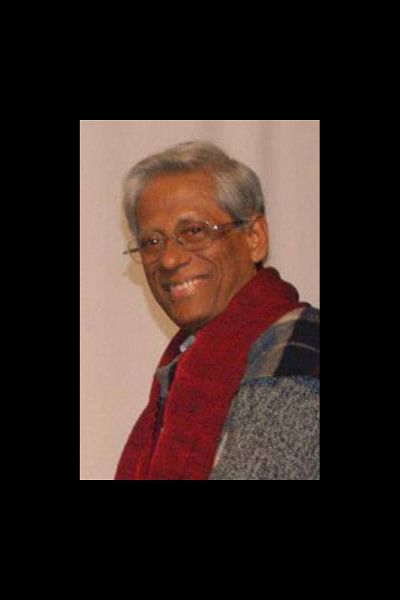PERISCOPING INTO BANGLA CINEMA

Only quality works can immortalise an artiste - … Gazi Rakayet
Shah Alam Shazu
Gazi Rakayet, a popular actor and director, has left distinguishable marks in the spheres of television and theatre where he has been working for decades. Starting off his career as an actor on the stage, Rakayet gradually moved to theatre direction before stepping into the vast territory of television drama as an actor, director and script writer.
Later, Rakayet ventured into filmmaking with his first feature film “Mrittika Maya” that brought this talented artiste the rare achievement of National Film Awards in 17 categories.
An excerpt from this actor-director's recent conversation with this correspondent.
What's the impetus behind the artistic excellence of an artiste?
Rakayet: I think there lives a king inside the heart of every artiste. And that's why he/she wants the world to know the works of that inner king. Some artistes achieve it through hard work and perseverance, while the rest fail. As an artiste, I am driven by the irresistible desire to showcase my work for people.
Did you ever think of getting such accolades while “Mrittika Maya” was in the making?
Rakayet: No. It never came to my mind while I was working on the project. However, it is true that this award has brought me immense respect, success and love in my personal and family life as well as on a national platform. I am a teacher, theatre artiste and director. I am happy in the respect that I receive in these spheres..
Your take on this award?
Rakayet: It's a record which no film in our country has ever set before. I think I was honest to my work and I worked hard which brought me this success. This achievement has enlivened my work and the film will forever be remembered. That's my achievement as the director of “Mrittika Maya”.
What drove you to make such a film?
Rakayet: When I was in my early 20s, I resolved that whatever I did in life must contribute to the welfare of people. That commitment is still the force behind my work.
What's the theory behind your success?
Rakayet: My good intent, perseverance and hard work have landed me here. I want to live through my works. Only quality works can immortalise an artiste.

“We need a film-friendly environment” …Masihuddin Shaker
Staff Correspondent
Masihuddin Shaker is a noted filmmaker and architect. He is famous for his film “Surjadighal Bari”. In a recent conversation with The Daily Star, he shared his visions on film making of the past and present time while addressing some important issues. Excerpts:
“I think that the relation between art and commercialisation should be balanced. A good film always contains two features -- idealistic substance and entertaining elements.
Perhaps, there are some able filmmakers in our society, but they are subservient to the producers. The producers primarily think of the returns on his/her money invested.
That's why they try to control everything. On the other hand, an overall decay of our collective values and ideals prevails in our political, economic and social phases.
If these persist, a creative and sensitive field like films cannot go ahead. The change of our political culture is a must to save not only film but also our overall culture.”
“The people have taken film as a business. But it is a powerful medium of art. Film can change many things in society. Filmmakers have now become dependent on the investors.
The making of good films even mediocre social films has become rare. Filmmaking on government grants must be enhanced and encouraged. The most important thing is to create a film-friendly environment in Bangladesh. We have to address the real points; otherwise, observance of National Film Day will bear little fruit.”

“Development of cinema is a long journey” …Nirab
Staff Correspondent
Nirab has been in the film industry for a while now, and has found a footing as a leading man on the silver screen. Talking to The Daily Star, he shared his insights about the industry's dynamics, and how it is moving ahead.
“The last three months have been frustrating for the film industry because of the country's current situation.
Not many films have released, and those that have released have not done great business because people have not been in the right frame of mind to watch films. But overall, one of our biggest limitations is budget, and it's directly connected to the size of the market.
You cannot convince a producer to invest 10 crores in the market even if you promise the most amazing film; because he knows this market will not yield enough monetary returns for him.
Just as a small example, Shah Rukh Khan released 'Don 2' in 17 countries and 3500 cinema halls at once; our films release in around 35 halls. And the market will not grow overnight.
The after-effects of the vulgarity that prevailed in Bangla cinema 10-15 years ago, still linger; the people that turned away from our films because of that, will only start coming back eventually when they are convinced that our cinema is getting better.
I think in the last few years, better stories have been told in films, our film's music has improved a great deal, and piracy has gone down. It has not happened automatically; people have been working hard, and the results are showing."
“Because of digital filmmaking, good movies are being made on small budgets, and that has attracted more investors.
That, in turn has increased competition, and competition is the best way to raise the standards of an industry. Development of cinema is a long journey, and I believe our films are moving towards the better.”

“We're going to a school without teachers” … Apu Biswas
Staff Correspondent
Apu Biswas, one of the busiest film actresses of our times, spoke to The Daily Star about the limitations and scenario of the film industry of the country. Excerpts:
“We are continuously striving to do better work and to take our cinema further, but the problem is we don't really know how to get there.
It's true for everyone involved in the industry – from on-screen artistes to technicians. We do not have a guideline to follow, so everyone is doing what they think is best, but the industry cannot progress like that.
It's like we're all going to school, but there are no teachers. I think directors, artistes, producers –we all need some form of schooling and exercise, so we have a clear direction.
Today's world is very competitive; thanks to the internet, everything is at the tip of everyone's fingertips. If what we do is not good enough, people will naturally choose something else."
“While the new wave of digital cinema has its upsides, there are downsides too. People not equipped with the right skills are making sub-standard works, and those are also releasing in halls, and count towards our cinema industry, which is actually drawing the industry back."
“Our film industry has to step up. When I was young, I'd see a heroine wearing a pretty dress and I'd make a dress like that. I can't say with certainty that anyone follows my fashion now. It's a collective struggle of ours, to take Bangla cinema to greater heights.”

 For all latest news, follow The Daily Star's Google News channel.
For all latest news, follow The Daily Star's Google News channel. 



Comments